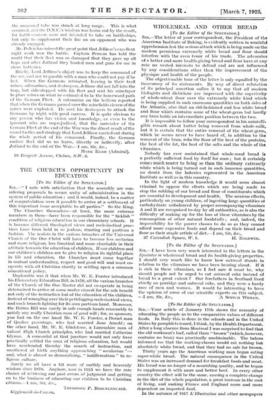THE CHURCH'S OPPORTUNITY IN EDUCATION
[To the Editor of the SPECTATOR.] Sfa,—" I note with satisfaction that the assembly are con- sidering proposals to secure unity of administration in the system of public education ; and it would, indeed, be a matter of congratulation were it possible to arrive at a settlement of this important issue acceptable to all parties." So the King.
The Churches themselves—at least, the more extreme members in them—have been responsible for the "ticklish " condition of religious education in our elementary schools. It is because different theological views and ecclesiastical prac- tices have been held in so jealous, rixating and partisan a fashion. The zealots in the various branches of the Universal Church of the One Christ will have to become less sectarian and more religious, less fanatical and more charitable in their attitude towards the education-of children. If our children and our children's children are to give to religion its rightful place in life and education, the Churches must come together in mutual understanding, respect and good will and must co- operate with all Christian charity in settling upon a common .educational policy.
Deplorable was it that when Mr. W. E. Forster introduced his Elementary Education Bill, in 1870, all the various branches of the Church of the One Master did not co-operate in being determined to arrive at some modus vivendi for the sole benefit not only of theinstruction but of the education of the children, instead of wrangling over their pettifogging ecclesiastical views, and each branch fighting for its own partisan hand. Moreover, -the Bairns Bill was surely in safe enough hands reasonably to satisfy any really Christian man of good will ; for, as sponsors, you had on the one hand Mr. W. E. Forster, a Dorset man of Quaker parentage, who had married Jane Arnold ; on the other hand, Mr. W. E. Gladstone, a Lancashire man of valiant High Church principles, who had married Catherine Glynne. A concordat at that juncture would not only have practically settled the crux of religious education, but would have accelerated thereby the march of instruction, and smothered at birth anything approaching " secularism "- and, what is almost as demoralizing, indifferentism " to re- ligious culture.
Surely we all have a bit more of earthly and heavenly
wisdom since 1870. Anyhow, now in 1925 we have the rare chance of retrieving our past errors of judgment and getting on to the business of educating our children to be Christian citizens.—I am, Sir, &c., THEODORE P. BROCKLEHT:RST.


























































 Previous page
Previous page